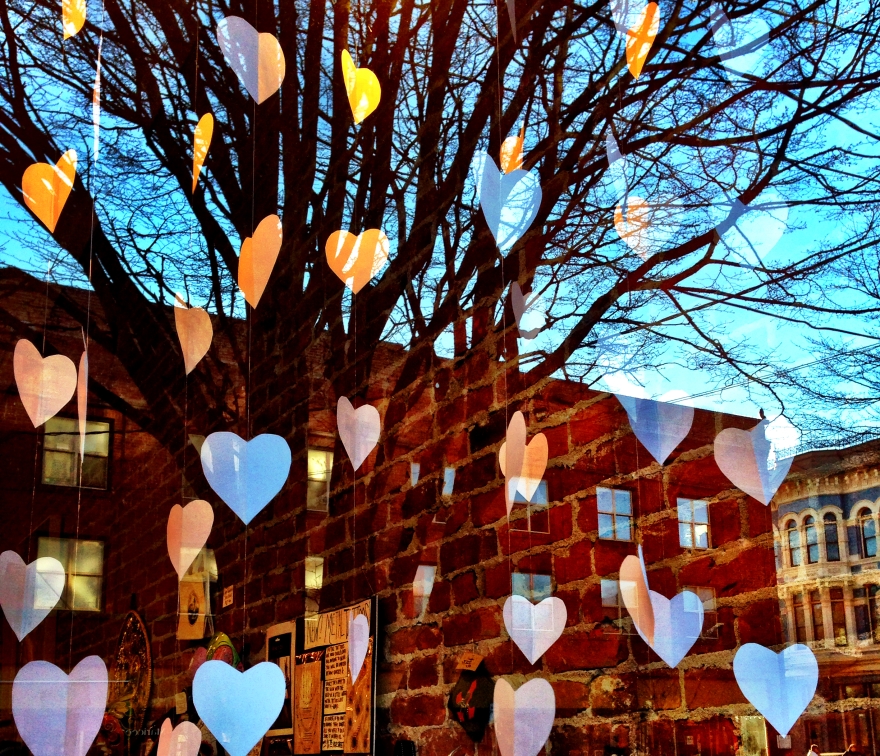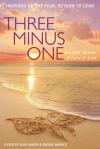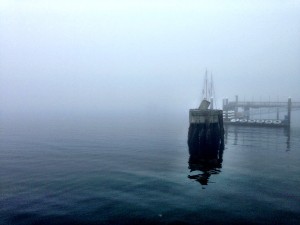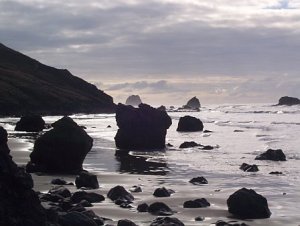Walking past a jewelry store a few days before Valentine's Day, I see a window display of cutout hearts dangling on silver ribbons.
I forget, until I remember.
Hearts cut out, dangling on ribbons of memory. I see tender threads of sorrow connecting us to our losses: loved ones passed on; friends who have passed us by; lovers whose touch has faded with time. My cutout hearts: our first child, due February 10; our second child, due February 14.
I forgive, until I rage.
This time of year usually finds me deep underground, out of the chatter, holding my grief silent and sacred. But this year—the year of charmolypi—I decide to hang on and hang out, to push through and pretend. I forget how raw I can become, as though my skin has been stripped away.
I am together, until I fall apart.
What happens is coincidence. A curse of timing. Mercury in Retrograde. At my most vulnerable, I linger in a social media forum on the cusp of a weekend, like a child in the schoolyard at recess, watching as a group knits together, their backs to me, intent on their own games, speaking their secret language. The language of sisterhood. The language of motherhood. Languages I will never speak, countries I will never visit.
I am whole, until I break.
All the rage. All the raw hurt. It pours out in little-girl loneliness. I lose my shit. I really do. For days, a ticker-tape parade of all my faults and shortcomings replays in digital neon shoutycaps:
JULIE, NO ONE WILL EVER PICK YOU FOR THEIR TEAM BECAUSE YOU ARE
withdrawnawkwardweirduglysillyclumsyboringnotasisternotamothernotoneofus
And then it stops. Not all at once. It takes some serious self-talk and soul-searching. The gushing fire hydrant of self-hate eventually diminishes to a lawn sprinkler, and then to the last trickle from a closed water spout. It takes keeping my eyes peeled for moments of grace.
I stand in shadow, until I turn my face to the sun.
Grace comes first from the inside. A recognition that all my rational energy is fighting the good fight—the one that keeps my head above water when it sees the tsunami wave of depression bearing down. It comes in the letting go of unfair expectations—of myself, of others.
Other moments of grace follow: an article, shared by Rene Denfeld—whose powerful writing and capacity for compassion serve as inspiration for the writer and woman I strive to be—and in the reading, I accept my grief for what it is—endless and all right (Getting Grief Right); an essay by Elizabeth Gilbert that makes me realize I must reclaim the shit I've lost and own it. Own that I hurt, that I overreact in moments of acute pain and loneliness, and forgive myself for not always getting the really awful stuff just right.
Emotional healing guru Iyanla Vazant says, “When you see crazy coming, cross the street.” In this case, I meet crazy in the middle of the road. I put my arms around her and say, "You are loved. You are worthy. Now, let's celebrate."
I walk, until I dance.
A wee package arrives in the mail from someone who has never met me, but who offers up her faith in me, her heart, her home. In the grace of a sparkling just-spring day, I melt.
"I think all sorrows can be borne if you put them into a story or tell a story about them." I pulled this from that lovely New York Times article to which I linked above. The thing is, I'm writing about my sorrows. I'm writing a whole huge novel about the sorrows. It's the toughest work I've ever done. My character, Holly, she isn't me. The story isn't autobiographical, although some of the places are places I've been, some of the experiences are ones I've had. But it's not so much that I'm writing about what I know; rather, I'm writing what I feel.
I write, until I heal.
That girl on the playground feels a warm hand slip into hers, pulling her away from what she doesn't have, into the embrace of what she does: the love of wonderful boy. My Valentine.
I am not a novelist, really not even a writer; I am a storyteller. One of my friends said about me that I think all sorrows can be borne if you put them into a story or tell a story about them, and perhaps this is not entirely untrue. To me, the explanation of life seems to be its melody, its pattern. And I feel in life such an infinite, truly inconceivable fantasy. ~ Isak Dinesen




